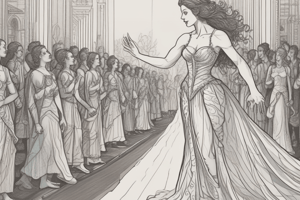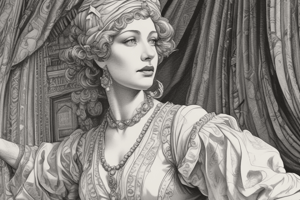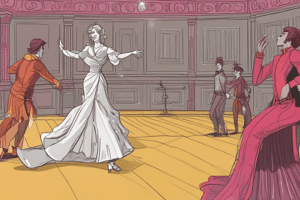Podcast
Questions and Answers
What is the primary goal of scene study in acting?
What is the primary goal of scene study in acting?
What is the first step in approaching scene study?
What is the first step in approaching scene study?
What is the primary purpose of sense memory in acting?
What is the primary purpose of sense memory in acting?
What is the main difference between sense memory and emotional recall?
What is the main difference between sense memory and emotional recall?
Signup and view all the answers
Why is understanding relationship dynamics important in scene study?
Why is understanding relationship dynamics important in scene study?
Signup and view all the answers
What is the outcome of using scene study techniques effectively?
What is the outcome of using scene study techniques effectively?
Signup and view all the answers
What is the primary focus of emotional recall in acting?
What is the primary focus of emotional recall in acting?
Signup and view all the answers
What is the relationship between scene study and emotional expression?
What is the relationship between scene study and emotional expression?
Signup and view all the answers
What is the main goal of the emotional memory technique in acting?
What is the main goal of the emotional memory technique in acting?
Signup and view all the answers
What is a key element of physicality of emotion in acting?
What is a key element of physicality of emotion in acting?
Signup and view all the answers
What is the importance of active listening and reacting in scene study?
What is the importance of active listening and reacting in scene study?
Signup and view all the answers
What is the result of forcing emotions in acting?
What is the result of forcing emotions in acting?
Signup and view all the answers
What is essential for authentic emotional expression in acting?
What is essential for authentic emotional expression in acting?
Signup and view all the answers
What is the key to creating memorable and engaging scenes in acting?
What is the key to creating memorable and engaging scenes in acting?
Signup and view all the answers
What is the first step in building a strong ensemble in scene study?
What is the first step in building a strong ensemble in scene study?
Signup and view all the answers
What is the significance of active listening and responsiveness in ensemble acting?
What is the significance of active listening and responsiveness in ensemble acting?
Signup and view all the answers
What is the goal of ensemble acting in scene study?
What is the goal of ensemble acting in scene study?
Signup and view all the answers
What is the importance of trusting the process in acting?
What is the importance of trusting the process in acting?
Signup and view all the answers
What is the primary benefit of actively listening to fellow actors' cues and lines?
What is the primary benefit of actively listening to fellow actors' cues and lines?
Signup and view all the answers
What is the primary goal of creating a collective energy among ensemble actors?
What is the primary goal of creating a collective energy among ensemble actors?
Signup and view all the answers
Why is maintaining focus and concentration crucial in ensemble acting?
Why is maintaining focus and concentration crucial in ensemble acting?
Signup and view all the answers
What is the key to balancing individuality and group dynamics in ensemble acting?
What is the key to balancing individuality and group dynamics in ensemble acting?
Signup and view all the answers
Why is adaptability and flexibility important in ensemble acting?
Why is adaptability and flexibility important in ensemble acting?
Signup and view all the answers
What is the primary benefit of trust and support among ensemble actors?
What is the primary benefit of trust and support among ensemble actors?
Signup and view all the answers
What is the primary goal of exploring emotional exercises in ensemble acting?
What is the primary goal of exploring emotional exercises in ensemble acting?
Signup and view all the answers
What is the ultimate goal of understanding the dynamics of ensemble acting?
What is the ultimate goal of understanding the dynamics of ensemble acting?
Signup and view all the answers
What is the primary focus of imagined circumstances in scene study?
What is the primary focus of imagined circumstances in scene study?
Signup and view all the answers
What is the key benefit of active listening in scene study?
What is the key benefit of active listening in scene study?
Signup and view all the answers
What is the primary goal of moment-to-moment acting?
What is the primary goal of moment-to-moment acting?
Signup and view all the answers
What is the role of physicality and gesture in scene study?
What is the role of physicality and gesture in scene study?
Signup and view all the answers
What is the primary benefit of improvisation in scene study?
What is the primary benefit of improvisation in scene study?
Signup and view all the answers
What is the key aspect of voice and vocal expression in scene study?
What is the key aspect of voice and vocal expression in scene study?
Signup and view all the answers
What is the primary goal of understanding emotional triggers in scene study?
What is the primary goal of understanding emotional triggers in scene study?
Signup and view all the answers
What is the role of emotional preparation in scene study?
What is the role of emotional preparation in scene study?
Signup and view all the answers
What is the primary benefit of scene study in acting?
What is the primary benefit of scene study in acting?
Signup and view all the answers
What is the key to creating a believable performance in scene study?
What is the key to creating a believable performance in scene study?
Signup and view all the answers
Study Notes
Scene Study and Emotional Expression
- Scene study allows performers to delve deep into their characters and explore the emotional landscape of a scene.
- Understanding various scene study techniques can help actors bring authenticity and depth to their performances.
Techniques for Scene Study
- Breaking Down the Text: Analyze the script, identify given circumstances, subtext, and objectives of each character, and pay attention to tone, rhythm, and underlying meaning of the dialogue.
- Sense Memory: Recall personal experiences to evoke genuine emotions by using sensory details like smells, tastes, sounds, and physical sensations.
- Emotional Recall: Use personal experiences to evoke specific emotions by focusing on memories that resonate with the character's emotions in the scene.
- Relationship Dynamics: Understand the dynamics between characters by exploring their histories, conflicts, and desires, and pay attention to power dynamics, emotional connections, and shifts in relationships.
- Imagined Circumstances: Create a detailed backstory for the character, imagining their life, experiences, and motivations, even if not explicitly stated in the script.
- Active Listening: Develop active listening techniques to enhance performances, focus on genuinely listening to the scene partner, and pay attention to non-verbal cues, subtext, and emotional changes.
- Moment-to-Moment Acting: Stay present and alive in each moment of the scene, respond organically to the scene partner, and avoid planning or anticipating how the scene will unfold.
- Physicality and Gesture: Use physicality to convey emotions, pay attention to posture, gestures, and facial expressions, and experiment with physical choices that align with the character's emotional state.
- Improvisation: Utilize improvisation techniques to explore different possibilities within a scene and discover new emotional layers and dynamics.
- Voice and Vocal Expression: Experiment with vocal tone, pitch, volume, and pacing to convey the character's emotions, and explore variations in rhythm, pauses, and emphasis to underscore the character's intentions and emotional journey.
Expressing Emotions Authentically
- Understanding Emotional Triggers: Identify the situations, thoughts, or memories that evoke specific emotions to better access emotions in a scene.
- Creating Emotional Preparation: Engage in emotional preparation before a scene, establish the emotional state of the character, and explore thoughts, sensations, and emotions associated with the character's situation.
- Emotional Memory: Recall personal experiences that resonate with the emotions required for the scene to draw on genuine feelings and emotions.
- Physicality of Emotion: Pay attention to the body's physical responses to emotions, such as clenched fists for anger or tears for sadness, to enhance authenticity.
- Active Listening and Reacting: Engage in active listening and reacting to the scene partner, listen to the words, tone, and body language, and respond accordingly.
- Avoid Forced Emotions: Focus on connecting with the emotional truth of the character and the circumstances of the scene, rather than forcing emotions that are not genuinely felt.
- Embracing Vulnerability: Open yourself up to genuine emotions and allow yourself to be fully present in the moment to create profound connections with the character and the audience.
- Trusting the Process: Trust in your training, trust that by fully immersing yourself in the character and the scene, the emotions will flow naturally and authentically.
Understanding the Dynamics of Ensemble Acting
- Establishing a Strong Foundation: Build trust, collaboration, and a shared vision within the ensemble, and engage in team-building exercises and activities to foster camaraderie and unity.
- Active Listening and Responsiveness: Highlight the significance of active listening and responsiveness among ensemble actors, and engage in exercises that improve listening skills.
- Creating a Collective Energy: Emphasize the importance of creating a collective energy among ensemble actors, and discuss how the energy generated by one actor can influence and uplift the entire group.
- Maintaining Focus and Concentration: Explain the need for maintaining focus and concentration during ensemble acting, and suggest exercises and techniques to improve focus and concentration skills.
- Balancing Individual and Group Dynamics: Explore the delicate balance between individuality and cohesive group dynamics within an ensemble, and discuss how each actor's unique interpretation enhances the overall dynamic of the scene.
- Adapting and Flexibility: Stress the importance of adaptability and flexibility in ensemble acting, and encourage actors to be open to experimentation and adjustments.
- Developing Trust and Support: Highlight the significance of trust and support among ensemble actors, and suggest exercises and activities that cultivate trust and support.
Studying That Suits You
Use AI to generate personalized quizzes and flashcards to suit your learning preferences.
Description
Explore techniques for scene study and emotional expression to enhance acting performances. Understand how to bring authenticity and depth to characters through scene study.




